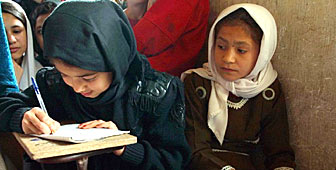Child abusers targeted by Swiss

Countries that violate children's rights should face international courts. That's the message Switzerland has taken to a UN conference on children.
The notion of international justice for children is one of several measures Switzerland hopes to promote at the United Nation’s special session on children, which opened in New York on Wednesday.
The conference, which brings together over 65 world leaders and delegates from 180 countries, is spending the three days setting new global goals to improve the lives of children.
The meeting comes over ten years after the Convention on the Rights of the Child was signed.
Spawned at the 1990 UN Summit for Children, the convention was signed by 71 countries that agreed to pursue 27 specific goals.
Those goals included halting state-perpetrated violence against children, eradication of child poverty and sexual exploitation, and an end to child labour.
Some 150 million children malnourished
This week’s meeting – originally scheduled for September 2001, but postponed following the terror attacks on the United States – is the first opportunity for the world community to review those goals.
Of the 27 targets set out 1990, the UN says six have been reached, 12 have made “some progress”, three have made “no progress at all” and six remain inconclusive.
In a report released in April, the UN said successes include the global eradication of polio, a halving of diarrhoea-caused fatalities and the “virtual elimination” of iodine deficiency disorders.
More children are in school than ever before and three million fewer child deaths are recorded every year than when the conference was first held.
By contrast, the UN says the world has made no progress on the goal of halving maternal mortalities, and at least 150 million children remain malnourished.
There are still ten million fatalities every year from preventable causes, every 20th child is not in school and some 300,000 are fighting in wars.
The report argues that if governments are to become “truly serious” about reducing poverty, they must make children their first priority.
Switzerland takes to world stage
For Switzerland, which signed the convention in 1997, the conference is a chance to lift its international profile as it prepares to join the UN.
Jean-François Giovannini, head of the Swiss delegation, said Switzerland wants to ensure non-government organisations (NGOs) engaged in fighting for child rights get more financial support from governments.
“We are doing something, but not enough, to help NGOs which are looking after street children, or looking after the rehabilitation of victims of sexual exploitation,” Giovannini told swissinfo.
“If you rescue a young girl from a brothel in Thailand, and she’s 12 or 13, she needs to be educated to learn a job. A lot has to be done in this field,” he said.
Switzerland also hopes to use the meeting to push for the introduction of mechanisms to ensure international criminal procedures are used to judge violations of children’s rights.
In addition, Giovannini said Switzerland remains concerned about the spread of child pornography on the Internet. Child welfare groups have long complained that governments are not doing enough to combat child pornography.
“I think much more money has to be invested in chasing this because it’s very modern technology, there are huge amounts of very disgusting things happening.
“And when something is on the Internet, somebody has produced it at one time, so a child has been subjected to this kind of treatment.”
More than just talk
Giovannini defended the conference against criticism that it would become a UN gathering inspired by lofty ideals but flawed by a lack of impact.
“It’s a strategy meeting at the highest level. It’s not operational in the sense that the congress will take concrete measures. But there is a lot of money spent on international cooperation, about $50 billion per year.
“And if we have a good strategy together for spending this money, I think it’s a lot more efficient than if we have no strategy.
Giovannini said the need to coordinate between countries would continue to grow.
“The question of children is of major importance because children are weak,” Giovannini said. “Where there is a disruption of family systems – whether through war, famine or earthquake – children always suffer most.
“Children should receive full protection for health, should be protected against exploitation and should receive a proper education. This is why for us, [the meeting] is very important.”
Along with the national leaders, over 1,500 people representing NGOs are attending alongside high-profile figures such as Nelson Mandela and Microsoft founder Bill Gates.
by Jacob Greber

In compliance with the JTI standards
More: SWI swissinfo.ch certified by the Journalism Trust Initiative
You can find an overview of ongoing debates with our journalists here. Please join us!
If you want to start a conversation about a topic raised in this article or want to report factual errors, email us at english@swissinfo.ch.